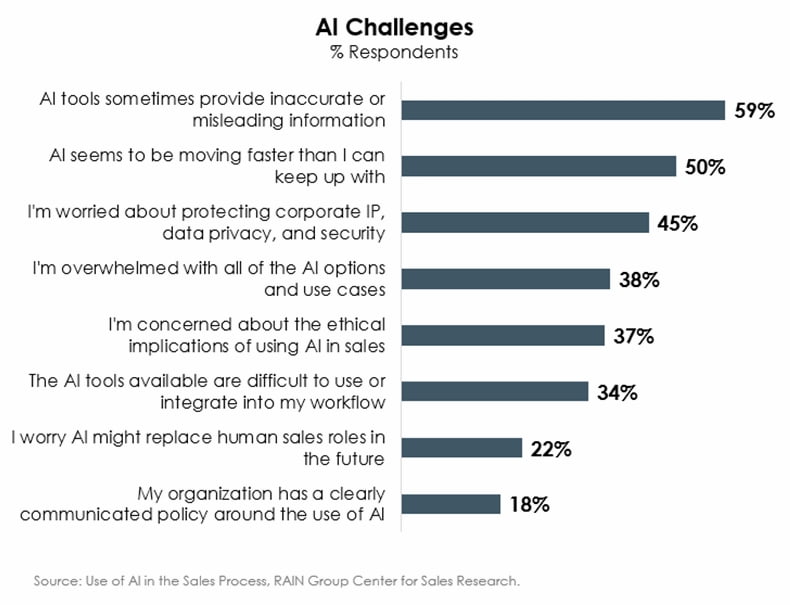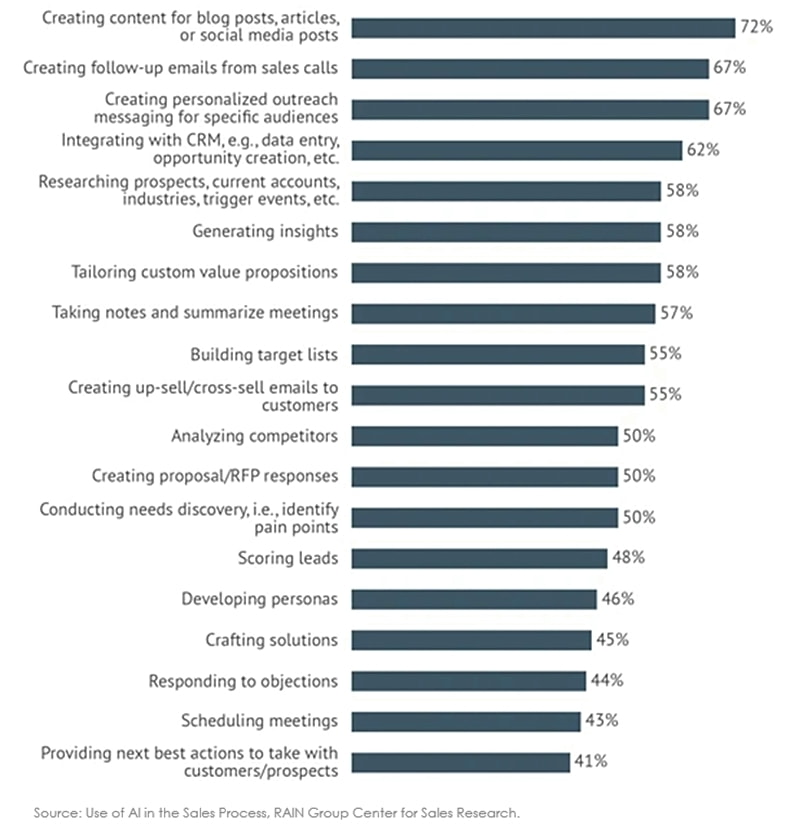Lately, it seems we don't have a conversation with prospects or clients in which they don't raise the topic of artificial intelligence (AI).
But when pressed about what they mean by AI, many are at a loss. Do they mean AI in the sales process? Predictive analytics? Embedded in the CRM? Applications in training and enablement?
All of that, or something else entirely?
Certainly, media coverage has contributed to the buzz. But is the excitement surrounding AI grounded in results or is it driven by hype?
To take a pulse on the current use of AI by sales organizations, RAIN Group surveyed 250+ sales leaders, managers, sellers, and professionals across diverse industries globally. Specifically, we wanted to learn how AI is being used to usher prospective buyers through the buying process, the challenges facing sales organizations as they implement AI, and whether they're getting value from its use.
For sales organizations seeking to boost sales performance and productivity, the following research insights shed light on some approaches sales teams are using, the benefits they're experiencing, and the AI-adoption challenges they're facing.
Top 10 Ways Sales Teams Use AI
Just 20% of respondents use AI tools on a frequent or daily basis, according to the survey. Most sales teams are rarely using AI in the sales process (27%) or they have never used it (27%).
However, those who have used AI with any frequency agree or strongly agree that they get value by using AI to...
- Create content for blog posts, articles, or social media posts (72% agree or strongly agree)
- Create follow-up emails from sales calls (67%)
- Create personalized outreach messaging for specific audiences (67%)
- Integrate with CRM—e.g., data entry, opportunity creation, etc. (62%)
- Research prospects, current accounts, industries, trigger events, etc. (58%)
- Generate insights (58%)
- Tailor custom value propositions (58%)
- Take notes and summarize meetings (57%)
- Build target lists (55%)
- Create upsell/cross-sell emails to customers (55%)
(Note: For additional ways Sales is using AI, check the full chart at the end of this article.)
But are those users of AI seeing an impact on their sales performance and productivity because of their AI use? Yes, they say: 26% reported achieving significant or transformational impact.
And it turns out that those who report the greatest impact from AI on their sales performance and productivity are three times more likely to use AI tools daily or frequently. And that makes sense: You must use the tools and technologies if you're going to get impact from them.
Benefits of AI in the Sales Process
Those sales organizations using AI in the sales process today may be early adopters, but they're already experiencing benefits in five key areas:
1. Refining Client Engagement Through AI-Enhanced Messaging
Sixty-eight percent of respondents strongly agree or agree that AI helps them improve value messaging in client interactions. These users recognize AI's ability to help them craft messages that resonate deeply with clients' specific needs and preferences.
AI allows for a level of customization that strengthens the relevance and impact of messaging and drives the overall effectiveness of engagement strategies.
2. Streamlining Operational Efficiency
Sixty-eight percent of survey participants strongly agree or agree that AI is reducing time spent on manual tasks. Efficiency gains come from automating routine, labor-intensive tasks.
By delegating data entry, scheduling, customer record management, and similar tasks to AI, sales professionals can redirect their focus toward more strategic actions, including relationship building, in-depth client needs analysis, and deal closure.
3. Personalization of Customer and Prospect Interactions
Sixty-three percent of respondents strongly agree or agree they benefit from AI's capacity to personalize interactions with customers and prospects.
By tapping into historical interaction data, purchasing patterns, and preferences, AI can help to create a more individualized and engaging customer experience. That tailored approach not only elevates customer satisfaction but also fosters long-term loyalty.
4. AI as a Catalyst for Effective Sales Communication
Sixty-two percent of respondents find AI beneficial for crafting effective sales cadences. AI's analytical power, informed by sales data and customer behavior insights, can guide the development of impactful communication strategies—identifying outreach methods, timing, and messaging for each stage of the sales process.
5. Gaining Strategic Insights Through AI-Driven Analytics
Finally, 60% of respondents benefit from the valuable sales insights provided by AI. Advanced analytics capabilities enable AI to process and interpret vast data sets, uncovering critical insights that would be challenging to gather manually. Those insights range from identifying the most promising prospects to understanding emerging market trends.
AI Challenges in the Sales Process
Unsurprisingly, the adoption of AI into the sales process is not all rainbows and unicorns. Far from it. Among the challenges cited by research participants:

Still, despite the challenges, early research introduced in this article and research from other organizations, including Gartner and McKinsey, point to the potential for sales performance and productivity gains with the effective application of AI.
Interestingly, even many of those achieving the greatest impact from AI on their sales performance say they're overwhelmed by the AI options and use cases (45%). Perhaps because the more you go down the AI rabbit hole, the more possibilities you uncover.
Organizations that address the challenges head-on will be better positioned to succeed with AI. For instance, 82% of survey respondents overall report their organization doesn't have a clearly communicated policy around the use of AI. Yet, those reporting the greatest impact are significantly more likely to say their organization has such a policy (31%) compared with those reporting less impact (17%).
* * *
The integration of AI into the sales process is not without challenges, but it constitutes a significant opportunity for sales organizations.
The insights from the RAIN Group's research underscore the impact AI can have in enhancing customer engagement, streamlining operations, and driving sales process effectiveness.
For sales organizations and sales professionals, adapting to and embracing AI's capabilities will prove to be a strategic advantage.
How Sales Teams Use AI

More Resources on the Use of AI in the Sales Process
10 Ways to Use AI for Sales Success [Infographic]




